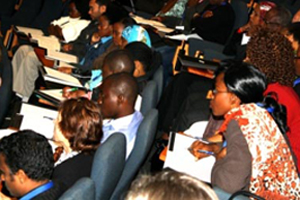Vaccines for Africa
16 November 2010 | Story by Newsroom Expert ears: Delegates at the Sixth Annual African Vaccinology Course hosted by the Vaccines for Africa Initiative, based at the IIDMM.
Expert ears: Delegates at the Sixth Annual African Vaccinology Course hosted by the Vaccines for Africa Initiative, based at the IIDMM.
Children in developing countries have access to fewer vaccines, increasing the 'vaccination gap' between developed and developing countries.
So said Professor Gregory Hussey of UCT's Institute of Infectious Diseases and Molecular Medicine (IIDMM) at the opening of the Sixth Annual African Vaccinology Course on 8 November.
Hussey highlighted the advantages of vaccines over pharmaceutical drugs, including cost-benefits, the fact that the vaccine need only be given once or very few times, and that the vaccines have a higher safety profile.
Although there was an increase in the number of vaccines included in the routine immunisation programmes, Hussey noted, concerns remained that the vaccination gap between developed and developing countries was increasing, with children being the most vulnerable. So increasing access to immunisation programmes can have a huge impact on the health of a nation.
Attended by 76 participants from 18 African countries, the course was hosted by the Vaccines for Africa Initiative, based at the IIDMM. It builds capacity among African researchers in various disciplines associated with vaccinology.
The week-long event included expert presentations from the World Health Organisation, the South African Department of Health, academics and industry representatives. For more information visit the Vaccines for Africa website.
 This work is licensed under a Creative Commons Attribution-NoDerivatives 4.0 International License.
This work is licensed under a Creative Commons Attribution-NoDerivatives 4.0 International License.
Please view the republishing articles page for more information.










